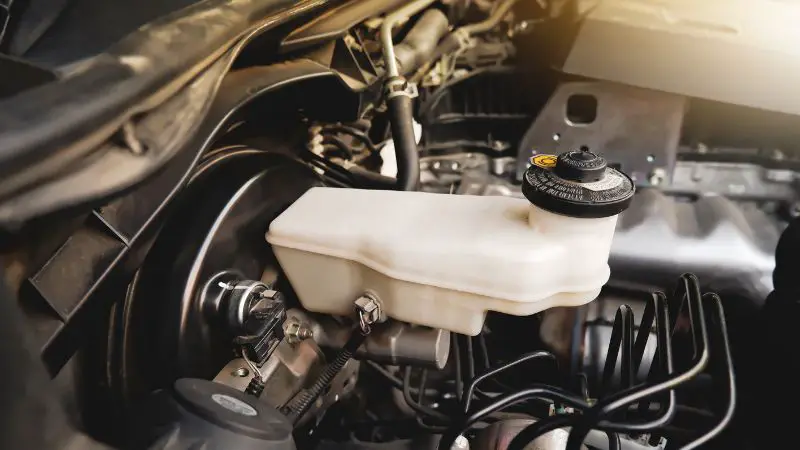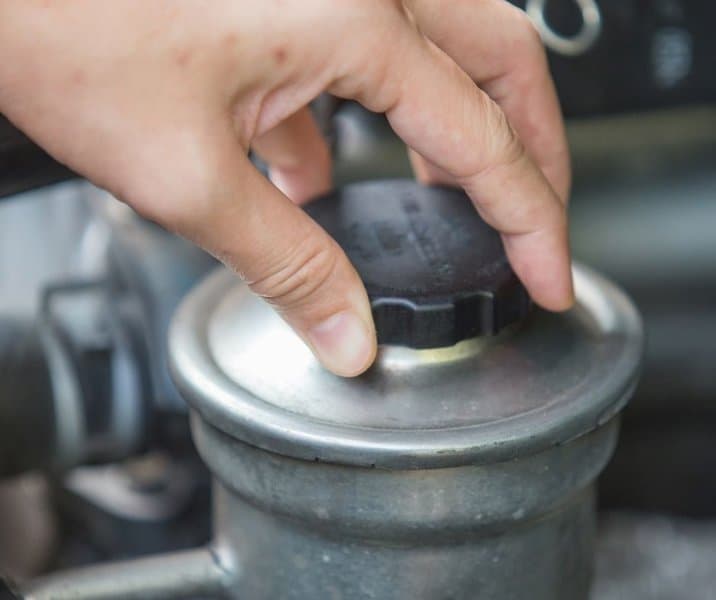In a car, the power steering fluid is a critical system component, and the brake fluid stops your vehicle in case of a brake failure. Power steering fluid and brake oil are hydraulic fluids found in many cars.
However, the two significant variances make them unique hydraulic fluids rather than substitutes for each other. And they are made of very different chemicals. Because of this, you can’t switch between the two liquids, or they’ll damage the power steering pump, master cylinder, and other expensive parts.
You’ll learn more about the dangers of mixing these two types in the article Brake Fluid In Power Steering, so be sure to keep reading.

What’s In Brake Fluid?
The fluid used in the braking system is called brake fluid. It is a type of hydraulic fluid used to power up the parts of a car’s braking system, like the hydraulic brake and the hydraulic clutch.
As an anti-corrosive agent and lubricant for all moving parts of bicycles, motorcycles, automobiles, and trucks, the primary function of this sort of fluid is to enhance the braking power of cars.
Glycol-ether, mineral oil, or silicone are the primary ingredients of most brake fluids on the market. If water gets into the system, they take steps to stop corrosion. This kind of liquid boils at a high temperature.
What is Power Steering Fluid?
An automobile’s power steering fluid is categorized as a low-viscosity hydraulic fluid (LVHF). It primarily works by increasing the pump’s pressure.
A car’s power steering system improves by using these fluids, which give drivers additional control above the steering wheel. The oxidation resistance of this fluid is comparable to that of other hydraulic fluids.
Power steering fluid levels are checked during routine automotive maintenance to ensure that the vehicle’s pinion and rack receive enough support. Power steering fluid is compressible despite its high boiling point.
Can I Use Brake Fluid in Power Steering?
The brake fluid in your power steering system hurts the gaskets, rubber hoses, and seals in your power steering system. Also, the brake line swells and leaks, while other pieces disintegrate and cause the power steering to fail.
Using brake fluid in your power steering system is a bad idea because it can cause severe damage to your car. It’s difficult to remove brake fluid, especially if it’s circulating in your steering system. As time passes, the damage done by brake fluid in your power steering system increases.

The steering pump may eventually fail. As your braking fluid consists of alcohol, the pump requires lubrication from a petroleum-based product such as the steering fluid.
Even if you mistakenly pour a little brake fluid into the power steering system, it will cause severe damage to your car. If you use brake fluid instead of power steering fluid, drain the power steering fluid as quickly as feasible.
When you don’t drain the brake fluid promptly, it might cause expensive harm. Your power steering will not be able to move at a fast rate, and that is because of the corrosive nature of the braking fluid, which will cause the steering system’s metallic surfaces to rust and wear out quickly, lowering its long-term reliability.
If you use your brake fluid to replace your power steering fluid, you should expect a full breakdown of your brake system.
Can You Use Power Steering Fluid For Brake Fluid?
This chemical difference means brake and power steering fluids cannot be used interchangeably.
Even if additives like glycol ether or borate ester reduce the corrosiveness of braking fluid, the substance itself is still corrosive. It would cause the rubber seals to wear out because they cannot withstand the chemical compound.
Lubrication is the second and more severe issue. The lubricating properties of power steering fluid are superior to those of brake fluid. Substituting brake fluid for power steering fluid will cause premature wear and failure.
What To Use Substitute For Power Steering Fluid In My Car?
Synthetic oil
It’s a synthetic lubricant created from petroleum or distillate crude oil that is chemically synthetic.
When the car moves, synthetic fluid has a soft, smooth flow. In addition, it has improved lubricating properties, reducing system friction.
As temperatures fluctuate, this lubricant will keep the viscosity stable and allow your car to run well in any conditions. With this oil, you’ll save money and time because of its excellent oxidation resistance.
Universal fluids
All-purpose fluids have a few specific ingredients in them. They have their advantages and are similar to other liquid substitutes in terms of benefits.
Performance and responsiveness improve as a result. This oil can also self-fill and seal tiny leaks, reducing corrosion while they are in use.
Power Steering Substitutes
Consult your vehicle’s owner’s manual for information on temporary power steering fluid substitutes products.
You can use transmission oil in place of power steering lubrication if needed in an emergency. When used in excess, these chemicals might harm your system over time.
As a result, the best course of action is to supply the vehicle with a suitable volume of replacement fluid.
Engine oil
When an engine oil has hydraulic qualities, you can use it to substitute power steering fluids. Power steering fluid has a much lower viscosity than engine oil. To keep the system more stable, use only a tiny amount of this oil with the usual power steering oil.
Hydraulic oil
It is possible to use hydraulic fluids instead of power steering lubricants. You can also use these if you run out of power steering lubrication.
Remember that these chemicals aren’t perfect replacements. But they will help you if you run out of power steering fluid.
FAQs
Q. Can I use motor oil for the power steering fluid?
You cannot replace brake oil with engine oil. Brake calipers and internal components can be damaged and degraded in performance if you use engine oil to clean them. Furthermore, engine oil can block brake system components because it is a heavy liquid.
Q. What Can I Use Instead of Brake Fluid?
If your car’s brake pads are in good condition, you should only use brake fluid that is in good condition. Brake pads can degrade due to the friction created by brake fluid when they wear out.
Conclusion
Some people have the wrong idea about how power steering and brake fluid differ. When it comes to power steering fluid, many people are confused as to whether it’s the same as brake fluid.
Power steering fluid helps to lubricate and cool the parts inside the power steering system. It reduces friction and makes the system work better. And by using brake fluid, you can stop the wheels from turning, and you can also use it to clean the power steering system.
If you use the correct fluid, you won’t have to worry about headaches or more repairs. This article about brake fluid in power steering will help you decide what’s best for you and your car and how to avoid making mistakes.

